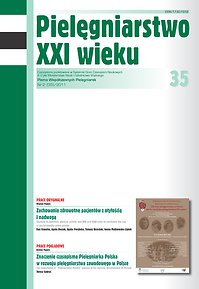Traumatic events relevant to the occupation of midwives and burnout syndrome
Keywords:
midwife, traumatic events, posttraumatic stress disorder PTSD), burnout syndromeAbstract
Aim. Aim of this study was to measure the frequency of occupational crisis events and non-occupational traumatic events, and their relation to burnout. It was assumed that exposure to traumatic events would rise work stress levels, and eventually lead to burnout.
Material and method. The test group consisted of 52 midwives. An original survey questionnaire that assesses confrontations with occupational crisis events was used, together with the Stressful Life Events Screening Questionnaire (SLESQ) and the Maslach Burnout Inventory (MBI).
The results. The test group consisted of 52 midwives. An original survey questionnaire that assesses confrontations with occupational crisis events was used, together with the Stressful Life Events Screening Questionnaire (SLESQ) and the Maslach Burnout Inventory (MBI).
Conclusion. Our research found that significant exposure to crisis and traumatic events did not directly affect the level of occupational burnout. This issue requires further exploration, particularly in the area of coping and resources.
References
1. Wilczek-Rużyczka E. Wypalenie zawodowe a empatia u lekarzy i pielęgniarek. Wydawnictwo Uniwersytetu Jagiellońskiego, Kraków, 2008.
2. Beisert M. Przejawy, mechanizmy i przyczyny wypalania się pielęgniarek. [w:] Sęk H., red. Wypalenie zawodowe. Przyczyny i zapobieganie. Wydawnictwo Naukowe PWN, Warszawa. 2009. s:182 – 215.
3. Płotka A., Michalik E., Makara-Studzińska M. i wsp. Zjawisko wypalenia w pracy zawodowej położnych a cechy osobowości. Annales Universitatis Mariae Curie – Skłodowska, Lublin – Polonia 2005, Vol.LX, Supp;. XVI, 7 153 – 162.
4. Lis-Turlejska M. Traumatyczne zdarzenia i ich skutki psychiczne. Wydawnictwo Instytutu Psychologii PAN, Warszawa, 2005.
5. Klonowicz T., Eliasz A. Traumatyczny stres w zawodowym doświadczeniu pracowników pogotowia. Rola niedopasowania osobowościowych regulatorów zachowania [w:] Strelau J., red. Osobowość a ekstremalny stres. Wyd. GWP, Gdańsk, 2004, 167-182.
6. Dudek B., Banach K., Zastosowanie teorii zachowania zasobów Stevana Hobfolla do analizy stresu traumatycznego [w:] Strelau J., Zawadzki B., Kaczmarek M., red. Konsekwencje psychiczne traumy. Wyd. Scholar, Warszawa, 2009, s. 64-74.
7. Dudek B., Zaburzenie po stresie traumatycznym. Wyd. GWP, Gdańsk, 2003.
8. Ogińska-Bulik N., Stres zawodowy. Wyd. Difin, Warszawa, 2006.
Downloads
Published
Issue
Section
License
Copyright (c) 2011 Authors

This work is licensed under a Creative Commons Attribution 4.0 International License.




